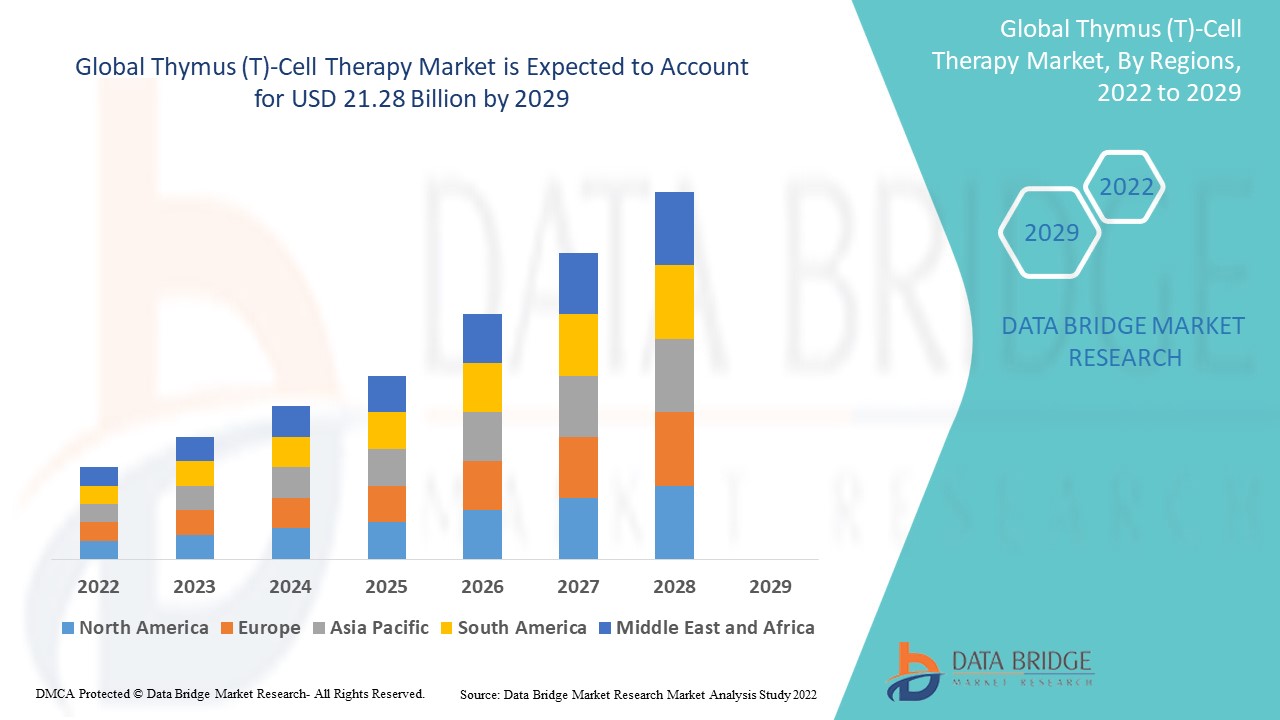Global T Cell Therapy Market
市场规模(十亿美元)
CAGR :
% 
 USD
5.45 Billion
USD
21.28 Billion
2021
2029
USD
5.45 Billion
USD
21.28 Billion
2021
2029
| 2022 –2029 | |
| USD 5.45 Billion | |
| USD 21.28 Billion | |
|
|
|
|
全球胸腺 (T) 细胞治疗市场,按治疗方式(研究、商业化)、疗法(基于 CAR T 细胞、基于 T 细胞受体 (TCR)、基于肿瘤浸润淋巴细胞 (TIL))、适应症(血液系统恶性肿瘤、实体瘤、其他)、最终用户(医院、专科诊所、家庭护理、其他)、分销渠道(医院药房、零售药房、网上药房、其他)划分 – 行业趋势和预测(至 2029 年)
市场分析和规模
T 细胞疗法是一种免疫疗法,通过改变免疫系统的一部分 T 细胞来治疗癌症。T 细胞取自人体血液样本,然后通过基因改造在其表面形成称为嵌合抗原受体 (CAR) 的特定结构。T 细胞疗法目前已获得 FDA 批准,作为某些类型的侵袭性、复发性或难治性非霍奇金淋巴瘤的标准治疗方法,例如弥漫性大 B 细胞淋巴瘤、原发性纵隔 B 细胞淋巴瘤、高级别 B 细胞淋巴瘤、转化性滤泡性淋巴瘤和套细胞淋巴瘤。T 细胞治疗还被批准用于 25 岁以下复发性或难治性急性淋巴细胞白血病患者。
Data Bridge Market Research 分析称,2021 年胸腺 (T) 细胞治疗市场价值为 54.5 亿美元,预计到 2029 年将达到 212.8 亿美元,在 2022 年至 2029 年的预测期内复合年增长率为 18.55%。Data Bridge Market Research 团队策划的市场报告包括深入的专家分析、患者流行病学、管道分析、定价分析和监管框架。
报告范围和市场细分
|
报告指标 |
细节 |
|
预测期 |
2022 至 2029 年 |
|
基准年 |
2021 |
|
历史岁月 |
2020(可定制为2014-2019) |
|
定量单位 |
收入(单位:十亿美元)、销量(单位:台)、定价(美元) |
|
涵盖的领域 |
治疗方式(研究、商业化)、疗法(基于 CAR-T 细胞、基于 T 细胞受体 (TCR)、基于肿瘤浸润淋巴细胞 (TIL))、适应症(血液系统恶性肿瘤、实体瘤、其他)、最终用户(医院、专科诊所、家庭护理、其他)、分销渠道(医院药房、零售药房、网上药房、其他) |
|
覆盖国家 |
北美洲的美国、加拿大和墨西哥、德国、法国、英国、荷兰、瑞士、比利时、俄罗斯、意大利、西班牙、土耳其、欧洲其他地区、中国、日本、印度、韩国、新加坡、马来西亚、澳大利亚、泰国、印度尼西亚、菲律宾、亚太地区 (APAC) 的其他地区、沙特阿拉伯、阿联酋、南非、埃及、以色列、中东和非洲 (MEA) 的其他地区、巴西、阿根廷和南美洲其他地区 |
|
涵盖的市场参与者 |
辉瑞公司(美国)、葛兰素史克公司(英国)、诺华公司(瑞士)、赛诺菲公司(法国)、罗氏公司(瑞士)、百时美施贵宝公司(美国)、默克公司(德国)、Aurora Health Care(美国)、bluebird bio, Inc.(美国)、安进公司(美国)、吉利德科学公司(美国)、Aurora Biopharma.(美国)、Fate Therapeutics(美国)、Mustang Bio(美国)、Sorrento Therapeutics Inc.(美国)、TCR² Therapeutics(美国)、拜耳公司(德国)、Bellicum Pharmaceuticals Inc.(美国)、阿斯利康(英国)、强生私人有限公司(美国) |
|
市场机会 |
|
市场定义
T 细胞疗法是一种称为过继细胞转移 (ACT) 的免疫疗法技术,其中患者自身的免疫细胞用于治疗癌症。它需要使用白细胞分离术提取 T 细胞并在实验室中对其进行重新设计。然后复制这些重新设计的细胞并注入体内,它们会识别并杀死表面具有特定抗原的癌细胞。越来越多的 T 细胞疗法正在临床试验中进行测试。其中一项研究是创建一种现成的技术,用于从健康捐赠者那里收集免疫细胞并使其立即可用。
胸腺(T)细胞治疗市场动态
驱动程序
- 癌症发病率高
癌症患病率的上升将成为导致市场增长率扩大的主要驱动力。人们吸烟率的增加、不健康的饮食习惯和久坐的生活方式,所有这些都增加了患癌症的风险。因此,随着全球癌症患病率的上升,预计市场将出现增长。根据美国癌症协会的数据,预计到 2040 年将诊断出 2840 万例新癌症病例。这与被诊断患有骨髓和造血组织疾病的人数增加一起,是推动 T 细胞疗法需求的关键因素之一。
- 增加医疗基础设施投资
影响胸腺(T)细胞治疗市场增长率的另一个重要因素是医疗支出的增加,这有助于改善其基础设施。此外,各政府组织旨在通过增加资金来改善医疗保健基础设施,这将进一步影响市场动态。
此外,公共和私人组织不断增加的宣传活动以及老年人口的激增将扩大胸腺 (T) 细胞治疗市场。此外,优惠的报销政策和政府日益增多的优惠举措将导致胸腺 (T) 细胞治疗市场扩大。
机会
- 增加研发活动数量
此外,市场的增长还受到研发活动数量增加的推动。这将为胸腺 (T) 细胞治疗市场的增长提供有利的机会。冠状病毒疾病 (COVID-19) 的广泛传播促使世界各地的研究人员将 T 细胞疗法视为高危患者的治疗选择。美国食品药品监督管理局 (USFDA) 最近还批准了 T 细胞疗法,用于治疗患有急性淋巴细胞白血病 (ALL) 的儿童和患有晚期淋巴瘤的成人。因此,预计生产商将受益于诱人的前景,市场将增长。
- 新产品发布
在预测期内,由于公众需求旺盛,胸腺 (T) 细胞治疗市场行业参与者将推出新产品,预计将促进新的市场机会。例如,美国食品药品监督管理局于 2020 年 7 月批准使用细胞基因疗法 Tecartus (brexucabtagene autoleucel),用于治疗对先前治疗无反应或复发的套细胞淋巴瘤 (MCL) 成人患者。FDA 已批准嵌合抗原受体 (CAR) T 细胞疗法 Tecartus 作为首个针对 MCL 的细胞基因疗法。
此外,对先进技术开发的投资增加和新兴市场数量的增加将为预测期内胸腺 (T) 细胞治疗市场的增长进一步提供有利机会。
限制/挑战
另一方面,治疗相关的高成本将阻碍 2022-2029 年预测期内胸腺 (T) 细胞治疗市场的增长率。发展中经济体缺乏医疗基础设施和缺乏熟练的专业人员将对胸腺 (T) 细胞治疗市场构成挑战。此外,治疗相关的副作用(如恶心、脱发、呕吐等)以及对治疗缺乏认识将限制并进一步阻碍 2022-2029 年预测期内市场的增长率。
本胸腺 (T) 细胞治疗市场报告详细介绍了最新发展、贸易法规、进出口分析、生产分析、价值链优化、市场份额、国内和本地市场参与者的影响,分析了新兴收入领域的机会、市场法规的变化、战略市场增长分析、市场规模、类别市场增长、应用领域和主导地位、产品批准、产品发布、地域扩展、市场技术创新。如需了解有关胸腺 (T) 细胞治疗市场的更多信息,请联系 Data Bridge Market Research 获取分析师简报,我们的团队将帮助您做出明智的市场决策,实现市场增长。
患者流行病学分析
胸腺 (T) 细胞治疗市场还为您提供详细的市场分析,用于患者分析、预后和治疗。患病率、发病率、死亡率、依从率是报告中提供的一些数据变量。分析流行病学对市场增长的直接或间接影响,以创建更稳健、更全面的多变量统计模型,用于预测增长期的市场。
COVID-19 对胸腺 (T) 细胞治疗市场的影响
私营医疗保健行业是受疫情影响最大的领域之一。冠状病毒疫情对药品开发、生产和供应以及全球不同医疗保健公司的业务产生了重大影响。由于癌症患者更容易受到病毒感染,尤其是在化疗、干细胞移植或手术后,T 细胞疗法市场特别容易受到冠状病毒爆发的影响。COVID-19 导致 CAR-T 疗法药物临床试验被推迟。由于全球封锁,生产也暂停,这引发了供应链问题。然而,现在 COVID-19 疫苗随时可用,许多当局正试图确保救命药物和疫苗供应不间断。因此,预计未来市场将趋于稳定。
近期发展
- 2021 年 12 月,诺华宣布推出名为 T-Charge 的下一代 CAR-T 平台,该平台将成为诺华产品线中各种新型 CAR-T 细胞疗法的基础。T-Charge 平台保留了 T 细胞干性,即自我更新和发育的能力,从而产生了一种具有更高增殖潜力和更少疲劳 T 细胞的产品。T-Charge 允许 CAR-T 细胞主要在患者体内(体内)扩增,无需在体外(离体)进行长时间培养。
全球胸腺(T)细胞治疗市场范围
胸腺 (T) 细胞治疗市场根据治疗方式、疗法、适应症、最终用户和分销渠道进行细分。这些细分市场之间的增长情况将帮助您分析行业中增长缓慢的细分市场,并为用户提供有价值的市场概览和市场洞察,帮助他们做出战略决策,确定核心市场应用。
情态
- 研究
- 商业化
治疗
- 基于CAR-T细胞
- 基于 T 细胞受体 (TCR)
- 基于肿瘤浸润淋巴细胞 (TIL)
指征
- 血液系统恶性肿瘤
- 淋巴瘤
- 白血病
- 骨髓瘤
- 实体肿瘤
- 黑色素瘤
- 大脑和中枢神经系统
- 肝癌
- 其他的
- 其他的
最终用户
- 医院
- 专科诊所
- 家庭护理
- 其他的
分销渠道
- 医院药房
- 零售药店
- 网上药店
- 其他的
胸腺 (T) 细胞治疗市场区域分析/见解
对胸腺(T)细胞治疗市场进行了分析,并按国家、方式、治疗、适应症、最终用户和分销渠道提供了市场规模洞察和趋势,如上所述。
胸腺(T)细胞治疗市场报告涵盖的国家包括北美的美国、加拿大和墨西哥、欧洲的德国、法国、英国、荷兰、瑞士、比利时、俄罗斯、意大利、西班牙、土耳其、欧洲其他地区、亚太地区(APAC)的中国、日本、印度、韩国、新加坡、马来西亚、澳大利亚、泰国、印度尼西亚、菲律宾、亚太地区(APAC)的其他地区、中东和非洲(MEA)的其他地区、南美洲的巴西、阿根廷和南美洲其他地区
北美在市场份额和市场收入方面占据胸腺 (T) 细胞治疗市场的主导地位,并将在预测期内继续保持主导地位。这是由于主要关键参与者的存在以及医疗保健支出的增加将进一步推动该地区市场的增长率。此外,不断增加的研发活动将进一步推动该地区市场的增长率。
由于该地区研发活动不断增加,预计亚太地区将在 2022-2029 年预测期内实现增长。此外,医疗保健基础设施的发展和政府举措的不断增加将进一步推动该地区市场的增长率。
报告的国家部分还提供了影响单个市场因素和国内市场监管变化,这些因素和变化会影响市场的当前和未来趋势。下游和上游价值链分析、技术趋势和波特五力分析、案例研究等数据点是用于预测单个国家市场情景的一些指标。此外,在提供国家数据的预测分析时,还考虑了全球品牌的存在和可用性以及它们因来自本地和国内品牌的大量或稀缺竞争而面临的挑战、国内关税和贸易路线的影响。
竞争格局和胸腺(T)细胞治疗市场份额分析
胸腺 (T) 细胞治疗市场竞争格局按竞争对手提供详细信息。详细信息包括公司概况、公司财务状况、收入、市场潜力、研发投资、新市场计划、全球影响力、生产基地和设施、生产能力、公司优势和劣势、产品发布、产品宽度和广度、应用主导地位。以上提供的数据点仅与公司对胸腺 (T) 细胞治疗市场的关注有关。
胸腺(T)细胞治疗市场的一些主要参与者包括:
- 辉瑞公司 (美国)
- 葛兰素史克公司 (英国)
- 诺华公司(瑞士)
- 赛诺菲(法国)
- F. Hoffmann-La Roche Ltd.(瑞士)
- Bristol-Myers Squibb Company (US)
- Merck KGaA (Germany)
- Aurora Health Care (US)
- bluebird bio, Inc. (US)
- Amgen Inc. (US)
- Gilead Sciences, Inc. (US)
- Aurora Biopharma. (US)
- Fate Therapeutics (US)
- Mustang Bio (US)
- Sorrento Therapeutics Inc. (US)
- TCR² Therapeutics (US)
- Bayer AG (Germany)
- Bellicum Pharmaceuticals Inc. (US)
- AstraZeneca (UK)
- Johnson & Johnson Private Limited (US)
SKU-
Get online access to the report on the World's First Market Intelligence Cloud
- Interactive Data Analysis Dashboard
- Company Analysis Dashboard for high growth potential opportunities
- Research Analyst Access for customization & queries
- Competitor Analysis with Interactive dashboard
- Latest News, Updates & Trend analysis
- Harness the Power of Benchmark Analysis for Comprehensive Competitor Tracking
研究方法
数据收集和基准年分析是使用具有大样本量的数据收集模块完成的。该阶段包括通过各种来源和策略获取市场信息或相关数据。它包括提前检查和规划从过去获得的所有数据。它同样包括检查不同信息源中出现的信息不一致。使用市场统计和连贯模型分析和估计市场数据。此外,市场份额分析和关键趋势分析是市场报告中的主要成功因素。要了解更多信息,请请求分析师致电或下拉您的询问。
DBMR 研究团队使用的关键研究方法是数据三角测量,其中包括数据挖掘、数据变量对市场影响的分析和主要(行业专家)验证。数据模型包括供应商定位网格、市场时间线分析、市场概览和指南、公司定位网格、专利分析、定价分析、公司市场份额分析、测量标准、全球与区域和供应商份额分析。要了解有关研究方法的更多信息,请向我们的行业专家咨询。
可定制
Data Bridge Market Research 是高级形成性研究领域的领导者。我们为向现有和新客户提供符合其目标的数据和分析而感到自豪。报告可定制,包括目标品牌的价格趋势分析、了解其他国家的市场(索取国家列表)、临床试验结果数据、文献综述、翻新市场和产品基础分析。目标竞争对手的市场分析可以从基于技术的分析到市场组合策略进行分析。我们可以按照您所需的格式和数据样式添加您需要的任意数量的竞争对手数据。我们的分析师团队还可以为您提供原始 Excel 文件数据透视表(事实手册)中的数据,或者可以帮助您根据报告中的数据集创建演示文稿。














